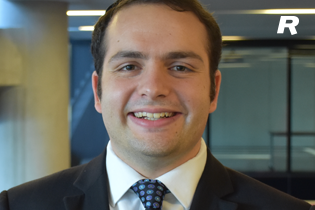 When MMA students Arjun Narayanan (MMA ’19), Naftali Weitz (MMA ’19) and Qianyi Zhu (MMA ’19) first heard about their eight-month practicum project with the major pharmaceutical company Janssen, they were excited — and a bit nervous.
When MMA students Arjun Narayanan (MMA ’19), Naftali Weitz (MMA ’19) and Qianyi Zhu (MMA ’19) first heard about their eight-month practicum project with the major pharmaceutical company Janssen, they were excited — and a bit nervous.
It was August 2018, and the three students had just started the first week of the Master of Management Analytics (MMA) program at Rotman. None of the students had experience working in the pharmaceutical industry or had much knowledge of the space.
“We all knew that healthcare would be an exciting industry to work in,” says Narayanan. “We didn’t have much experience in the industry, but we were committed. Over the next few months, we drew on our knowledge of advanced analytics and AI to do the best possible job on this project.”
The practicum project is a main feature of the MMA program at Rotman. At the start of the program, student teams are matched with an organization and tasked with solving a management issue using data-based approaches. Students take ownership of the project from beginning: they must define the business problem they are trying to solve and spend months cleaning, analyzing and interpreting data sets before delivering a set of recommendations to their partner organization.
Though it might seem like a daunting project, the students get help along the way. Not only do they work closely with data scientists and subject matter experts at their partner organizations, they draw from lessons from the classroom and discuss their progress with a faculty advisor at Rotman. The work is worth it; students leave the program with the knowledge, experience and confidence to pursue careers in analytics.
Digging into the data
 Narayanan, Weitz and Zhu’s project got off to a strong start.
Narayanan, Weitz and Zhu’s project got off to a strong start.
“The team at Janssen was supportive, and they gave us a great leads on where to begin. They had mentioned wanting to know more about communicating with doctors, but we knew that we’d need to narrow the scope of the project further,” explains Weitz. “We spent several weeks developing a true understanding of exactly what we were facing.”
The students started going to the Janssen offices in north Toronto every Friday so that they could get a stronger grasp of the organization’s business operations, their position in the industry, and the type of data they collected. At the same time, the students were considering timelines and a few of the techniques and models they were learning about in their classes. By the end of the first semester, they decided to focus on improving communication strategies with doctors treating patients with schizophrenia.
“We drew on our knowledge of advanced analytics and AI to do the best possible job on this project.”
–Arjun Narayanan, MMA ’19
When the second semester kicked off, they really started digging into the data.
“We studied every column and row closely so that we understood what every data point meant,” describes Narayanan.
To be efficient, they started splitting up the work. On project days, two group members stayed on campus to take advantage of software access and servers so that they could run simulations, while one student worked remotely from the Janssen offices.
In the days leading up to their final project deadline, they devoted most of their time to making sense of the data, while regularly meeting with their faculty advisor Allan Esser and Professor Dmitry Krass, the academic director for the MMA program.
“It took a lot of blood, sweat, tears and Google,” recalls Weitz. “Though it took us a while to get the data ready, once we produced the models and did the analysis, we felt really good about having some relevant results to share.”
Completing work that has value
 When it came time to deliver their final presentation in April 2019, they were ready.
When it came time to deliver their final presentation in April 2019, they were ready.
The students were confident in what they found: they had identified communication strategies for increasing awareness and access to a new effective schizophrenia drug. Based on what they unearthed from the data, they provided recommendations on which types of doctors Janssen representatives should approach, when the company should make first contact with doctors and how long to wait before following up.
Their efforts paid off.
“The Rotman students did a great job getting up to speed quickly on our industry, businesses, and data assets,” says Curtis Smith, a senior director in customer experience excellence at Janssen who supervised the team. “Their analysis and recommendations brought fresh insights into how we can more effectively engage with customers for one of our key franchises. Ultimately, their work has helped us better serve patients suffering with schizophrenia.”
It’s been a transformative learning experience for the students.
“It was really satisfying to see eight months of hard work come together,” says Zhu. “Best of all, it’s rewarding to know that patients will benefit from what we found.”
For her, the most meaningful learning came from seeing how analytics and business came together.
“I went into to this project eager to apply the most difficult and complex models I had learned about in class, thinking it would automatically give us the best results,” explains Zhu. “This project, and the MMA program generally, showed me how you need to understand business fundamentals and the problem you’re trying to solve, in addition to completing quality data interpretation to derive meaningful insights.”
Written by Rebecca Cheung | More Student Stories »